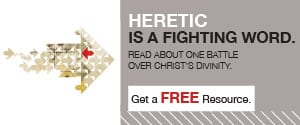Justin Holcomb has just released two new books for those interested in the history of the church. Know the Creeds and Councils and Know the Heretics.
I caught up with Justin to ask him about his new books.
Check it out!
Instead of asking, “what are your books about,” I’m going to ask the question that’s behind that question. And that unspoken question is, “how are readers going to benefit from reading your books?”
Justin Holcomb: Readers will benefit by enjoying an accessible overview of the main heresies, creeds, confessions, catechisms, and councils of Christian history. It is an introduction to some of the most important theological developments in the Christian tradition.
Why did you decide to write Know the Heretics and Know the Creeds and Councils?
Justin Holcomb: I wrote these books, first, out of personal interest. I wanted to study the stories of orthodoxy and heresy throughout the Christian tradition. Second, I wanted to provide overviews that walk readers through the most important expressions (and denials!) of Christian faith—not with a dry focus on dates and places, but with an emphasis on the living tradition of Christian belief and why it matters for our lives today.
Tell us a bit about the experiences that shaped the insights in both books.
Justin Holcomb: I’ve been interested in heretics since I was 17 and left a church that was influenced by the United Pentecostal denomination. United Pentecostals do not believe believe in the orthodox understanding of the Trinity. They believe in modalism, a heresy that claims that the Father, Son, and Holy Spirit are simply different modes, or forms, of God rather than distinct persons.
At 17, I was having intense theological discussions with some of the pastors at this church. I was convinced that what I was teaching at a church study group was considered orthodox since basically the beginning of Christianity. I had to study lots of church history, and particularly the history of creeds, councils, confessions, and heresies.
Additionally, I serve as an Episcopal priest. In the Anglican tradition the Apostles’ Creed, Nicene Creed, and Thirty-nine Articles are very important. So, these statement have shaped me in profound ways, some of which I am aware of and probably in many more ways I’m not aware of.
How are your books different from the other books on the same subjects?
Justin Holcomb: For some reason many books on “church history” are long and boring. But the stories of the Christian tradition are fascinating. These books are easy to read and very accessible. And serve as travel guides to the some of the significant events, doctrines, and heresies throughout Christian history. Each chapter covers a statement of faith (or heresy) and includes a glimpse of the historical context, an overview of key points, discussion questions, and suggested further reading.
Know the Creeds and Councils is not an academic book or only for “educated lay readers.” It is designed to be read by individuals or used in a group setting. My hope is that this book will complement more thorough treatments such as Jaroslav Pelikan’s Credo: Historical and Theological Guide to Creeds and Confessions of Faith in the Christian Tradition, which is a nearly seven-hundred-page book filled with top-notch historical scholarship on the creeds and confessions.
My hope is that Know the Heretics will complement longer works such as Alister McGrath’s Heresy: A History of Defending the Truth. His book is about heresy in general and touches only briefly on specific heresies and heretics.
Give us two insights from each book that would be helpful to Christians.
Justin Holcomb:
Know the Heretics
- Heresy is not located in one’s beliefs about baptism, one’s beliefs about the continuation of certain spiritual gifts, or one’s beliefs about a specific view of the atonement. It is a specific and direct denial of any of the central beliefs of the Christian church about the deity and identity of the triune God and about the person and work of Jesus Christ.
- Most of those dubbed heretics were usually asking legitimate and important questions. They weren’t heretics because they asked the questions. It is the answers that they gave that are wrong. They went too far by trying to make the Christian faith more compatible with ideas that they already found appealing, especially those of pagan Greek philosophy. Others struggled with Jesus’ claims to be both sent from God and one with God. The reactions of the religious leaders in the New Testament to Jesus’ claims underline the difficulty of this revelation and point to later struggles about Jesus’ identity.
Know the Creeds and Councils
- Obviously, Christianity did not begin when we were born. Nor did our generation invent Christian thought. We live two thousand years removed from the time of our founder, and—for better or for worse—we are the recipients of a long line of Christians’ insights, mistakes, and ways of speaking about God and the Christian faith. Today’s Christianity is directly affected by what earlier Christians chose to do and to believe.
- Even the finer points of Christian theology come out in our worship and lives. The humanity and deity of Jesus, the Trinity, the trust that we know we can put in Scripture are all beside us in our worship services and impact the way we honor God in our daily lives. And if that’s the case, then we ought to tackle high theology the same way that we tackle sin and the needs of the Christian community—as a body of Christ, using the parts of the body that are best suited to the task. The statements that are introduced in the book are the fruit of parts of the body that God gathered to proclaim and explain his gospel, stretching nearly two thousand years into the past.
What do you hope readers will walk away with after they finish your two books?
Justin Holcomb:
Know the Heretics: I hope that after reading this book readers will come away with a greater understanding of the main heretical figures and ideas that have most impacted the history of Christianity.
There is room for mystery in Christian belief. We must remember that the entirety of what we think Christians should believe is not identical to what a person must believe to be saved. We believe in justification by faith in Christ, not justification by accuracy of doctrine. We are not saved by our intellectual precision; we are saved by the grace of Jesus. That does not diminish the importance of correct doctrine, but rather allows it its proper place in glorifying the triune God, who graciously saves sinners because of the person and work of Christ.
The line between orthodoxy and heresy has developed over time and through theological conflict, and the line between heterodoxy and heresy is blurry. That means we need lots of wisdom, discernment, and humility before we declare that someone has departed into full-blown heresy. At the same time, we should be clear in our minds on the non-negotiables of Christian doctrine and belief.
Know the Creeds and Councils: I hope that after reading this book, readers will come away with a deeper and better understanding of how the church has wrestled with major doctrinal questions and has emerged stronger as Jesus continues to build his church.
Learning how Christians throughout history have wrestled with the tough questions of our faith gives us a valuable perspective that deepens our understanding of the Christian faith, increases our dependence on God’s revelation in Jesus Christ and Holy Scriptures, fuels our worship of God, increases our love for each other, and motivates mission to the world.














